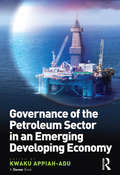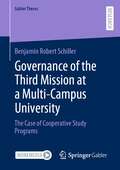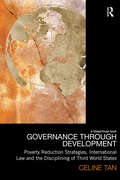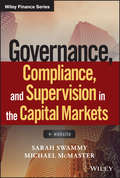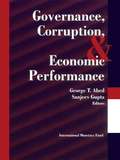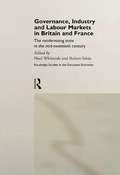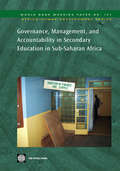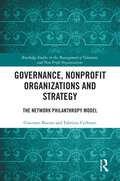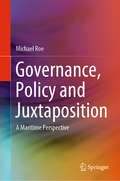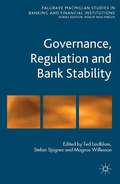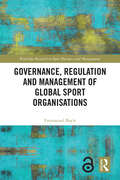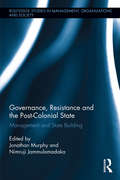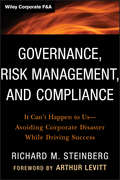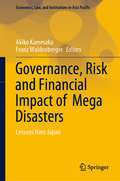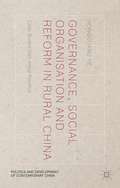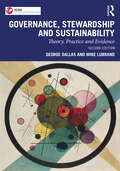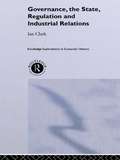- Table View
- List View
Governance of the Family Business
by John A. DavisReviews the ways to achieve governance of the family business. Points out the importance of plans (e.g., strategic plans), statements (e.g., mission statements), policies, rules, and agreements to the governance process. Discusses the roles of three structures in family business governance: the top management team, the family employee council, and the board of directors.
Governance of the Family Business Owners
by John A. DavisReviews the principal ways in which the owners of a family business achieve their governance objectives of a suitable identity and sensible direction and the discipline to achieve these. Covers the responsibilities and rights of owners, plus governance procedures, plans, policies, statements, rules, agreements, and structure.
Governance of the Global and Extra-Terrestrial Commons: What the Maritime Context Can Offer Outer Space
by Michael RoeThis book provides a unique analysis of the complex relationship between governance and the global commons. It has a specific reference to the dynamic and growing outer space economy and society, and how experience in the maritime sector (which exhibits many of the same issues and challenges as outer space) can be useful in suggesting moves forward in policy-making and design. This book fills a large gap in the literature of both governance and the development of outer space. Whilst the maritime sector has a long history of debate, albeit little in terms of governance and policy-making, outer space has much less and what there has been, commonly focused upon technical considerations. The importance of this book is that the failures of maritime governance need to be avoided in the outer space sector which exhibits many of the same issues particularly those related to the global commons. Innovative and exciting, this book will be of interest to academics studying corporate governance, business management, and space capitalism.
Governance of the IMF An Evaluation
by International Monetary FundA report from the International Monetary Fund.
Governance of the IMF Decision Making, Institutional Oversight, Transparency, and Accountability
by Leo Van HoutvenThe author-a top decision maker at the IMF for two decades-first focuses on the system of quotas and voting power in the IMF and concludes that it calls for reforms to enhance equity among the membership. He then examines decision making in the Executive Board, with an emphasis on consensus building in a cooperative institution, and the record of political oversight of the international monetary system through the Interim Committee and its successor, the International Monetary and Financial Committee. In that context, the author also comments on the impact on IMF decision making of the activities of groups of members, and of the differing interests of major shareholders. Thereafter, he recalls the distinctive features of the financial crises of the 1990s and examines their evolving implications for IMF governance. The essay concludes with an appraisal of IMF governance.
Governance of the Petroleum Sector in an Emerging Developing Economy
by Kwaku Appiah-AduOil exploration in the developing world has been and continues to be a high profile and high risk activity attracting media coverage and stimulating much debate. In Governance of the Petroleum Sector in an Emerging Developing Economy, Professor Kwaku Appiah-Adu has assembled an edited volume that provides insight into critical aspects of this highly sensitive activity. Professor Appiah-Adu’s starting point is Ghana, where he has been closely involved in national policy-making. The book makes comparisons between that African country and others as diverse as Trinidad and Tobago, and Norway. The contributors, global experts in their respective fields, explore five critical themes and propose strategies for progress in each. You will find an in-depth analysis relating to: turning oil and gas wealth into sustainable and equitable development; entrenching transparency and stakeholder engagement; effective management of the oil and gas sector; and safeguarding security and the environment. Finally, country specific models and lessons, particularly for Ghana and other African oil producing nations, are offered. This book serves as reference for business practitioners, policy makers, scholars, students and anyone interested in gaining insight into the oil and gas sector, particularly as it pertains to Ghana and other African petroleum producing nations, with lessons drawn from the global arena and international best practice.
Governance of the Third Mission at a Multi-Campus University: The Case of Cooperative Study Programs (Gabler Theses)
by Benjamin Robert SchillerThis book appeals to higher education scholars from various disciplines and practitioners looking for an overview and in-depth insight into cooperative study programs (CSPs). The CSPs combine elements of higher education with elements of professional work and illustrate how a teaching-related third mission achieves a socioeconomic contribution through its underlying stakeholder interactions. In Germany, CSPs are a growing phenomenon and, at the same time, a niche in higher education with approximately 100,000 students. Higher education scholars identified CSPs a challenge to higher education governance despite the simultaneous lack of empirical data. In this vein, this book pursues the question of how stakeholders influence the governance of the third mission in the case of CSPs. The study in this book refers to the “prime” example of CSPs at a German university of applied sciences—the Baden-Wuerttemberg Cooperative State University. The analysis revealed that four stakeholder groups are salient and influence the governance of the CSPs. These include professors, industry representatives, students, and representatives of government and higher education policy.
Governance through Development: Poverty Reduction Strategies, International Law and the Disciplining of Third World States (Law, Development and Globalization)
by Celine TanGovernance through Development locates the Poverty Reduction Strategy Paper (PRSP) framework within the broader context of international law and global governance, exploring its impact on third world state engagement with the global political economy and the international regulatory norms and institutions which support it. The PRSP framework has replaced the controversial structural adjustment programmes, as the primary mechanism through which official development financing is channelled to low-income developing countries. It has changed the regulatory landscape of international development financing, signalling a wider paradigmatic shift in the cartography of aid and, consequently, in the nature of north-south relations. Governance through Development documents and analyses this change within the legacy of postcolonial economic relations, revealing the wider legal, economic and geo-political significance of the PRSP framework. Celine Tan argues that the PRSP framework establishes a new regulatory regime that builds upon the disciplinary project of structural adjustment by embedding neoliberal economic conditionalities within a regime of domestic governance and public policy reform. The book will be of interest to scholars, researchers and students of law, political science and international relations, sociology and development studies.
Governance, Compliance and Supervision in the Capital Markets + Website (Wiley Finance)
by Sarah Swammy Michael McMasterThe definitive guide to capital markets regulatory compliance Governance, Compliance, and Supervision in the Capital Markets demystifies the regulatory environment, providing a practical, flexible roadmap for compliance. Banks and financial services firms are under heavy regulatory scrutiny, and must implement comprehensive controls to comply with new rules that are changing the way they conduct business. This book provides a way forward, with clear, actionable guidance that strengthens governance at all levels, and balances supervisory and compliance requirements with the need to do business. From regulatory schemes to individual roles and responsibilities, this invaluable guide details the most pressing issues in today's financial services organizations, and provides expert advice. The ancillary website provides additional tools and guidance, including checklists, required reading, and sample exercises that help strengthen understanding and ease real-world implementation. Providing both a broad overview of governance, compliance, and supervision, as well as detailed guidance on application, this book presents a solid framework for firms seeking a practical approach to meeting the new requirements. Understand the importance of governance and "Tone at the Top" Distinguish the roles of compliance and supervision within a financial services organization Delve into the regulatory scheme applicable to broker dealers, banks, and investment advisors Examine the risks and consequences of inadequate supervision at the organizational or individual level The capital markets regulatory environment is complex and ever-evolving, yet compliance is mandatory. A solid understanding of regulatory structure is critical, but must also be accompanied by a practical strategy for effective implementation. Governance, Compliance, and Supervision in the Capital Markets provides both, enabling today's banks and financial services firms to get back on track and get back to business.
Governance, Conflict, and Natural Resources in Africa: Understanding the Role of Foreign Investment Actors
by Hany Gamil BesadaA country's abundant natural resources may serve as a curse or a blessing, with the outcome often dependent on prevailing governance structures and experience managing these assets. Despite natural resource advantages, many African countries have failed to transform their enormous economic potential and wealth into tangible benefits such as sustainable socio-economic development, human security, or peace.Governance, Conflict, and Natural Resources in Africa reevaluates the role that foreign state-owned and private-sector actors play in resource-rich states – whether stable, post-conflict, or fragile – in sub-Saharan Africa. Through research and an analysis of in-depth interviews with local stakeholders in Ghana, Sierra Leone, and Ethiopia, Hany Besada explains how foreign state-owned and private-sector corporations have contributed to economic growth at both the national and local levels in different resource-rich countries. This book reveals the unique challenges and opportunities created by these investors, demonstrating that new policies in business practices and operations have the potential to generate sustainable development and positive economic transformation.Governance, Conflict, and Natural Resources in Africa puts forward a novel framework for understanding the role of private economic actors in extractive industries in Africa and sheds new light on foreign private-sector contributions to capacity building and economic development.
Governance, Corruption, and Economic Performance
by Sanjeev Gupta George T. AbedThis book brings together a range of research studies carried out by the IMF with the objective of promoting good governance in member countries in order to increase economic growth and reduce poverty. Topics discussed include: the causes and consequences of corruption; its impact on public finances and the provision of public services, tax revenues, income equality and poverty; and the issue of governance in transition economies.
Governance, Industry and Labour Markets in Britain and France: The Modernizing State (Routledge Studies in the European Economy)
by Robert Salais Noel WhitesideThis volume brings together well-known scholars from a wide range of disciplines to provide a superb analytical and historical overview of how state policy has affected established economic and labour market systems in France and Britain. The contributors to this book explore some crucial questions: * how 'dirigiste' was the French state in reality * why was state intervention more acceptable in France than in Britain * how do the differences in state intervention help to explain the respective economic performances of the two countries since the second world war? The book draws on hitherto unpublished primary research by scholars in economic and social history, industrial relations, economics, law, political science, sociology and social policy. As such, it is a timely and welcome intervention into debates concerning the politics of modern labour markets specifically and the role of the state in economic modernization more widely. It will have strong appeal to researchers and students in several discplines.
Governance, Management, and Accountability in Secondary Education in Sub-Saharan Africa
by World BankIncreasingly the role of management and governance is recognized as important for providing and delivering effective services at all levels of education. In view of the growing demand for more and better services at secondary education levels, these are crucial issues that must be addressed urgently. Sub-Saharan Africa's secondary education and training systems must become more efficient and more effective. The current (unit) costs of junior and senior secondary education in most African countries prevent massive expansion of post-primary education. This demands a holistic approach to governance and management issues. In parallel, there is a demand from civil society and governments for greater accountability. This study aims to present best practices and identify sustainable development plans for expansion and improved quality and efficiency in the delivery of secondary education in Sub-Saharan Africa through better governance, management, and accountability.
Governance, Nonprofit Organizations and Strategy: The Network Philanthropy Model (Routledge Studies in the Management of Voluntary and Non-Profit Organizations)
by Giacomo Boesso Fabrizio CerbioniGrant-making foundations play a crucial role in financing a wide range of philanthropic projects that contribute to the social and economic development of targeted communities. In fulfilling this essential function, the trustees who serve on each foundation's board of directors must ensure not only the economic and financial stability of their organization but also a balance with the expectations of the diverse social actors operating in the community, including associations, cooperatives, and operational foundations. This book identifies the features of the planning, programming, and controlling model of foundations that better facilitate a positive mediation between a strategic approach and civic dimensions. It offers insights and practical recommendations for designing governance and control mechanisms that promote transparency, accountability, and a network approach in the grant-making process and underscores the significance of a suitable governance framework in fostering trust and mutual understanding between foundations and their stakeholders. The guidance provided in this volume is based on rigorous research and real-world experiences, making it relevant and applicable to scholars and practitioners in the field. It serves as a valuable resource for those seeking to enhance the governance mechanisms within nonprofit organizations to maximize the impact of their philanthropic initiatives.
Governance, Policy and Juxtaposition: A Maritime Perspective
by Michael RoeThis book considers governance and policy-making within the maritime sector, and focuses significantly on the dimensional context within which governance works. Recognising the importance of understanding governance and policy at times when the world is faced with social, political, and economic problems, it highlights the fact that both areas are equally significant in understanding today’s political economy. By focusing on the maritime sector, a pillar industry supporting international trade activities, the book offers a unique perspective to explain the difficulties of balancing policy-making with governance in order to provide solutions. It also examines the importance of developing a governance process that encourages and accommodates juxtaposition in a way that ensures that the effect of independent policy-making is understood upon the success or otherwise of policies across a range of contexts and problems.Given the in-depth nature of the text, it is of interest to academics, researchers and professionals in the field.
Governance, Regulation And Bank Stability
by Stefan Sjögren Ted Lindblom Magnus WillessonThis book provides novel insight into the governance of banks and looks at regulatory measures for strengthening bank stability. It includes empirical studies on the relationship between the board structures of banks and their financial risk-taking and analyses the determinants of bank reputation and the future prospects of small banks.
Governance, Regulation and Management of Global Sport Organisations (Routledge Research in Sport Business and Management)
by Emmanuel BayleThis book is a bold and ambitious analysis of the challenges facing global sport in the 21st century and how those challenges can be met through good governance, management and regulation. Connecting the political and managerial dimensions of sport, from international governing bodies such as the International Olympic Committee through to national governing bodies, leagues and professional sport organisations, the book offers a new way of thinking about the trajectory of contemporary sport. Adopting an innovative multi-level approach - across macro, meso and micro levels – the book explores the key challenges currently facing sport, including the rapid emergence of new sports such as MMA and adventure sports; the arrival of new actors in the international sport ecosystem, such as the Gulf states and private equity investment; the growth of new technologies, such as AI; and socio-political and developmental issues such as integrity, sustainability, demographic change and sport-for-development. It considers the interaction of actors at different levels, from states to athletes and across the public and private sectors, and explores different models of sport around the world, including the dominant European and North American models. Its findings support the argument that current and future international sports governance and regulation require a more complex and nuanced method of analysis. Offering a new vision for global sport, this is essential reading for advanced students, researchers, policymakers or practitioners working in sport management, governance or policy, or with a general interest in strategy, governance or public policy.The Open Access version of this book, available at http://www.taylorfrancis.com, has been made available under a Creative Commons Attribution-Non Commercial-No Derivatives (CC-BY-NC-ND) 4.0 license.
Governance, Resistance and the Post-Colonial State: Management and State Building (Routledge Studies in Management, Organizations and Society)
by Jonathan Murphy Nimruji JammulamadakaThe manifestation of the colonial nation-state as a legal-bureaucratic-police structure – an exploitation tool – undermined customary modes of governance in colonies. When post-World War II independence of colonies transferred ownership of the state structure to the colonized elite, electoral and civil society politics battled for capture of this post-colonial state. Meanwhile, the state was also forced to build its legitimacy in the face of customary governance practices seeking rehabilitation and decolonization in the midst of civil wars and strife. This "state-building social movement" was further complicated with the global spread of neoliberalism and neocolonialism, and herein lies the significant difference between the post-colonial nation-state and the Western nation-states. This book fills the gap in literature and argues that it is necessary to foreground discussions of the nature of the post-colonial nation-state in examining resistance and provides a window into the dynamics of the post-colonial state and its implication in everyday organizing and resistance.
Governance, Risk Management, and Compliance: It Can't Happen to Us -- Avoiding Corporate Disaster While Driving Success
by Richard M. SteinbergAn expert's insider secrets to how successful CEOs and directors shape, lead, and oversee their organizations to achieve corporate goals Governance, Risk Management, and Compliance shows senior executives and board members how to ensure that their companies incorporate the necessary processes, organization, and technology to accomplish strategic goals. Examining how and why some major companies failed while others continue to grow and prosper, author and internationally recognized expert Richard Steinberg reveals how to cultivate a culture, leadership process and infrastructure toward achieving business objectives and related growth, profit, and return goals. Explains critical factors that make compliance and ethics programs and risk management processes really work Explores the board's role in overseeing corporate strategy, risk management, CEO compensation, succession planning, crisis planning, performance measures, board composition, and shareholder communications Highlights for CEOs, senior management teams, and board members the pitfalls to avoid and what must go right for success Outlines the future of corporate governance and what's needed for continued effectiveness Written by well-known corporate governance and risk management expert Richard Steinberg Governance, Risk Management, and Compliance lays a sound foundation and provides critical insights for understanding the role of governance, risk management, and compliance and its successful implementation in today's business environment.
Governance, Risk and Financial Impact of Mega Disasters: Lessons from Japan (Economics, Law, and Institutions in Asia Pacific)
by Akiko Kamesaka Franz WaldenbergerThis book addresses researchers, practitioners, and policy makers interested in understanding the financial implications of mega-disaster risks as well as in seeking possible solutions with regard to governance, the allocation of financial risk, and resilience. The first part of this book takes the example of Japan and studies the impact of mega earthquakes on government finance, debt positions of private household and businesses, capital markets, and investor behavior by way of economic modeling as well as case studies from recent major disasters. In Japan, the probability of a mega earthquake hitting dense agglomerations is very high. Like other large-scale natural disasters, such events carry systemic risks, i.e., they can trigger disruptions endangering the stability of the social, economic, and political order. The second part looks at the experience of the Japanese government as a provider of disaster-risk finance and an active partner in international collaboration. It concludes with an analysis of the general characteristics of systemic risk and approaches to improve resilience.
Governance, Social Organisation and Reform in Rural China
by Hongguang HeXiaogang village, located in Anhui Province, was reputedly the first village in China to decollectivise in 1978, paving the way for agricultural reform and a new rural economy in China. This study explores how farmers in Xiaogang have engaged in various forms of cooperation in the decades since decollectivisation and the extent to which changing political and social contexts of the rural China are likely to impact upon the way in which farmers cooperate and collaborate with each other. In an attempt to understand the relationship between farmers and the state in a rapidly changing China, the text focuses upon governance and social organisation within the village and explores the extent to which farmers have autonomy in both their economic and political activities. While decollectivisation is often interpreted as the second 'liberation' of Chinese farmers, it is clear that new power structures have emerged to replace those of the collective and the commune. While many studies have explored this question in terms of a so-called binary opposition between the state and the community, they have tended to neglect the subtleties behind this opposition. Utilising Foucault's concept of 'governmentality', this study develops new ways of understanding micro-level power relations that enable and constrain certain forms of political and economic activity within the village.
Governance, Stewardship and Sustainability: Theory, Practice and Evidence
by George Dallas Mike LubranoThe first introductory practical guide of its kind, this book brings together principles of corporate governance, investor stewardship and enterprise sustainability in the context of institutional investment. Stewardship codes are developing in diverse markets to provide a framework for responsible institutional investment practices and fiduciary duties for beneficiaries. While codes provide a starting point, the application of stewardship in practical terms can be challenging for many institutional investors. Written by two well-known corporate governance experts, George Dallas and Mike Lubrano, and based on the ICGN training course on stewardship that they developed, this book gives needed clarity, rigor and guidance to practitioners about what we know—and don't know—about stewardship, governance and sustainability. It explores the theoretical foundations of stewardship, linking these to day-to-day decision-making and providing real-life examples and practical tools to evaluate issues that arise for companies from an environmental, social and governance perspective and generate ideas about how to make investor stewardship a practical reality in similar cases. Investor stewardship and ESG professionals, portfolio managers, senior managers, regulators and finance students will appreciate this unique guide to developing, refining and operationalising investor stewardship capabilities in line with the respected and internationally recognised ICGN policy framework.
Governance, The State, Regulation and Industrial Relations (Routledge Explorations in Economic History #Vol. 20)
by Ian ClarkThis book examines the legacy of economic and political aims and objectives formulated by the British government during, and immediately after the second world war. It examines contemporary patterns of regulation by the state, and reform in the industrial relations system as factors of these historically embedded influences. This book makes an important contribution to the history and theory of British post-war economics.
Governed by a Spirit of Opposition: The Origins of American Political Practice in Colonial Philadelphia (Studies in Early American Economy and Society from the Library Company of Philadelphia)
by Jessica Choppin RoneyCivic engagement in the City of Brotherly Love gave birth to the American Revolution.Winner of the Athenaeum of Philadelphia Literary Award of The Athenaeum of PhiladelphiaDuring the colonial era, ordinary Philadelphians played an unusually active role in political life. Because the city lacked a strong central government, private individuals working in civic associations of their own making shouldered broad responsibility for education, poverty relief, church governance, fire protection, and even taxation and military defense. These organizations dramatically expanded the opportunities for white men—rich and poor alike—to shape policies that immediately affected their communities and their own lives. In Governed by a Spirit of Opposition, Jessica Choppin Roney explains how allowing people from all walks of life to participate in political activities amplified citizen access and democratic governance. Merchants, shopkeepers, carpenters, brewers, shoemakers, and silversmiths served as churchwardens, street commissioners, constables, and Overseers of the Poor. They volunteered to fight fires, organized relief for the needy, contributed money toward the care of the sick, took up arms in defense of the community, raised capital for local lending, and even interjected themselves in Indian diplomacy. Ultimately, Roney suggests, popular participation in charity, schools, the militia, and informal banks empowered people in this critically important colonial city to overthrow the existing government in 1776 and re-envision the parameters of democratic participation. Governed by a Spirit of Opposition argues that the American Revolution did not occasion the birth of commonplace political activity or of an American culture of voluntary association. Rather, the Revolution built upon a long history of civic engagement and a complicated relationship between the practice of majority-rule and exclusionary policy-making on the part of appointed and self-selected constituencies.
Governing Academia: Who Is in Charge at the Modern University?
by Ronald G. EhrenbergPublic concern over sharp increases in undergraduate tuition has led many to question why colleges and universities cannot behave more like businesses and cut their costs to hold tuition down. Ronald G. Ehrenberg and his coauthors assert that understanding how academic institutions are governed provides part of the answer.Factors that influence the governance of academic institutions include how states regulate higher education and govern their public institutions; the size and method of selection of boards of trustees; the roles of trustees, administrators, and faculty in shared governance at campuses; how universities are organized for fiscal and academic purposes; the presence or absence of collective bargaining for faculty, staff, and graduate student assistants; pressures from government regulations, donors, insurance carriers, athletic conferences, and accreditation agencies; and competition from for-profit providers.Governing Academia, which covers all these aspects of governance, is enlightening and accessible for anyone interested in higher education. The authors are leading academic administrators and scholars from a wide range of fields including economics, education, law, political science, and public policy.Contributors: Ronald G. Ehrenberg, Cornell University; James O. Freedman, Dartmouth College; Thomas H. Hammond, Michigan State University; Donald E. Heller, Pennsylvania State University; Benjamin E. Hermalin, University of California, Berkeley; Gabriel E. Kaplan, University of Colorado; Adam T. Kezsbom, Cornell University; Daniel B. Klaff, Cornell University; Susanne Lohmann, University of California, Los Angeles; Matthew P. Nagowski, Cornell University; Michael A. Olivas, University of Houston Law Center; Brian Pusser, University of Virginia; Sarah E. Turner, University of Virginia; John D. Wilson, Michigan State University


